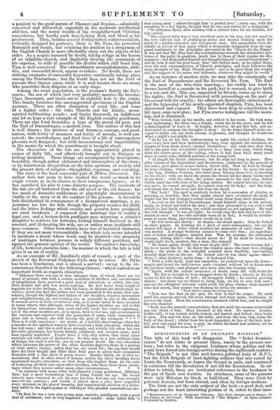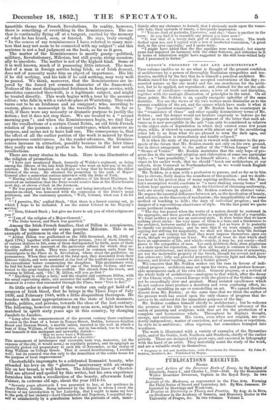REMINISCENCES OF AN EMIGRANT MILESIAN. * THE title of this book
will disappoint. The " Rebel Reminis- cences" do not relate to present times, rarely to the yoresent cen- tury; but refer to the emigrant Irishmen whom politics and the penal laws forced into foreign service during the eighteenth century. " The Brigade " is not that well-known political body of M.P.'s, but the Irish Brigade of hard-fighting soldiers that was raised by Louis the Fourteenth, or James the Second in exile, and continued in existence till the Revolution if not till the Restoration. In ad- dition to which, there are incidental references to the Irishmen in the pay of Spain and Austria. In strictness, some of the persons were only Milesian by blood, or half-blood. They were Irish by paternal descent, but born abroad, and often by foreign mothers. The Irish are not the only subject of the book ; a good deal, and perhaps not the least interesting portion of it, refers to that inex- • Reminiscences of an Emigrant Milesian. The Irish Abroad and at Home ; in
the Camp ; at the Court. With Souvenirs of "The Brigade." In three volumes. Published by Bentley.
haustible theme the French Revolutions. In reality, however, there is something of everything in the Reminiscences. The au- thor is continually flying off at a tangent, excited by the memory of what he has heard, seen, or fancied. He says, truly enough, " In the course of my reminiscences I have referred to many mat- ters that may not seem to be connected with my subject": and this sentence is not a bad judgment on the book, so far as it goes. The matter of the Reminiscences is mostly gossip—political, military, Revolutionary, Milesian, but still gossip, rising occasion- ally to anecdote. The matter is not of the highest kind. Some of it is well known, much of it possessing little interest. The mere fact of a man in foreign service being Irish, or of Irish descent, does not of necessity make him an object of importance. His life if he did nothing, and his talk if he said nothing, may very well be passed. We think, moreover, that the Reminiscences are in-
Nred by the forced yet common character of the framework. Notices of the most distinguished Irishmen in foreign service, with anecdotes connected therewith, is a legitimate subject, and might be treated directly. This work begins with a tour by the assumed editor; who falls in with a valet-de-place at Wurtzburg. This valet turns out to be an Irishman and an emigrant; who, according to custom, places a manuscript in the traveller's hands. So far so well, if there were any necessity or dramatic purpose to justify the fiction ; but it does not stop there. We are treated to a " second morning gun "; and when the Reminiscences begin, we find they are the recollections of a certain Count Robin, an old Irish-French relation of the penman : a clumsy contrivance, which answers no purpose, and seems not to have had one. The consequence is, that the effect of all the earlier portion of the work is marred by these preposterous contrivances. As the reader advances, the Reminis- cences increase in attraction, possibly because in the later times they really are what they profess to be, traditional if not actual recollections.
There are many stories in the book. Here is one illustrative of the religion of promotion.
" I have just mentioned Stack, formerly of Walshe's regiment, as being among the officers of the late Irish Brigade who went on half-pay at its dis- solution. He had remained on half-pay so long that he became the oldest Colonel of the army. He obtained his promotion to the rank of Major- General after a somewhat curious interview with the Duke of York.
" Having solicited the honour of an audience of his Royal Highness, he received an intimation that the Duke would receive him at the Horse Guards next day, at eleven o'clock in the forenoon. " He was punctual in his attendance ; and being introduced to the Com- mander-in-chief, was honoured with the expression of the Duke's usual politeness, and the customary question, Well, Colonel, what can I do for you ?'
" I perceive, Sir,' replied Stack, ' that there is a brevet coming out, in which I hope to be included. I am the senior Colonel in his Majesty's service.'
" True, Colonel Stack ; but give me leave to ask you of what religion are you ?'
" I am of the religion of a Major-General.' " The Duke bowed, and Stack was gazetted."
Among the Irish-French families, that of Dillon is conspicuous, though the name scarcely seems genuine Milesian. This is an example of politeness in one of the family.
" Arthur Dillon was guillotined on the 24th Germinal, An II, (14th of April 1794,) together with seventeen other persons, (two of them females,) of various stations in life, some of them distinguished by birth, more of them by crime. All were innocent of the particular offence for which they os- tensibly suffered death. They were conveyed in common carts from the Conciergerie to the Place de la Revolution, where stood the guillotine en permanence. When they arrived at the fatal spot, they descended from their hideous vehicle, and were mustered at the foot of the scaffold and counted by the executioner before commencing the slaughter. This preliminary over, he laid his hand upon the shoulder of one of the female victims, and mo- tioned to the steps leading to the scaffold. She shrank from his touch, and turning to Dillon, said, Oh ! M. Dillon, will you go first ?'
" Anything to oblige a lady,' said the elegant and courteous Dillon, with his usual captivating smile, and ascended the scaffold. His last words, pro- nounced in a voice that resounded through the Place, were Vive le Roil' "
So little order is observed if the writer can only get hold of a soupcon of Irish blood, that he brings in the Three Days of July 1830, and February 1848, with a little disquisition thereupon. He touches with more appropriateness on the state of Irish manners, habits, politics, and persons, towards the close of the last century. The following, however strange it may seem now, might have been matched in spirit sixty years ago in this country, by changing Jacobite to Jacobin.
"Long after the commencement of the Street, century there continued to exist in the front of a house in Nassau Street, Dublin, between Grafton Street and Dawson Street, a marble tablet, inserted in the wall in which a bust of King William, of the natural size, and in bas-relief, was to be seen, and beneath it this inelegant and unworthy distich- . May we never want a Williamite
To kick the breech of a Jacobite.'
This monument of intolerance and execrable taste was, moreover, (at the expense of the city, it would seem,) as regularly painted, and its epigraph as carefully picked out preparatory to each 4th of November, as the statue of King "William on College Green. That it caused heartburning, I recollect well; but its removal was due only to the demolition of the entire house for the purpose of local improvement."
Chesterfield's impromptu to a celebrated Romanist beauty, who attended his levy on the " glorious" anniversary with an orange lily on her breast, is well known. The felicitous lines of Chester- field are altered and spoiled by this writer, but his own experience furnishes him with a recollection of the beauty, afterwards Lady Palmer, in extreme old age, about the year 1814-15.
"Seventy years afterwards I was presented to her, at her residence in Henry Street, Dublin. Being informed by the friend to whom I owed the honour of my introduction to her Ladyship, that I ought to make my bow to the gods of her idolatry—Lord Chesterfield and Napoleon, I acquitted my- self so satisfactorily by a genuflexion before the portraits of each, mime-
diately after my obeisance to herself, that I obviously made upon the vener- able lady, then upwards of ninety, a favourable impression. " ' You are fond of portraits, I perceive,' said she ; there is another in the room : do you find it to resemble any person you have seen ? '
"It was that of a lovely dark girl of eighteen or twenty. The truth flashed upon me, and I replied with a bow of unaffected veneration, A great deal, in the eyes especially,' and I spoke truly. "I might have added that the fine aquiline nose remained ; but ninety years had impaired its harmony with the other features, and reference to it m terms of admiration might have suggested to the still keen-witted lady that I presumed to flatter."



































 Previous page
Previous page